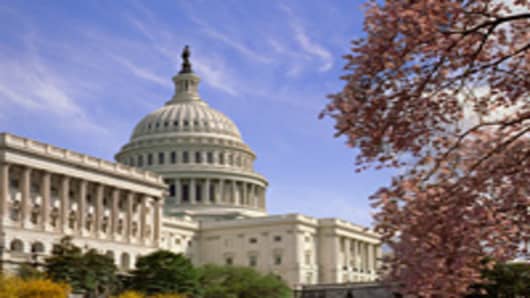Supporters of the Dodd-Frank Act boldly promised that by increasing government control over the economy to an unprecedented degree, they would end "too big to fail" and thus save taxpayers from future AIG-style bailouts.
But as we approach the second anniversary of Dodd-Frank and the fourth anniversary of the bailouts of AIG, Fannie Mae and Freddie Mac, if there's one thing we know, it's that Dodd-Frank did no such thing. Perversely, Dodd-Frank is making the problem of "too big to fail" even worse and taxpayers are more exposed to bailouts than before.
Dodd-Frank doesn't eradicate "too big to fail," or TBTF for short. No less an authority than the Federal Reserve Bank of Dallas notes in its latest annual report: "For all its bluster, Dodd-Frank leaves TBTF entrenched."
Indeed, the institutions that were "too big to fail" when Dodd-Frank was passed are every bit as big as they were before, and some are even bigger. Banking assets are concentrated in fewer banks. The five largest financial institutions now hold more than half of the banking industry's assets - about $8.5 trillion, which is equal to 56 percent of the country's Gross Domestic Product.
Many experts, including those at the Dallas Fed, say Dodd-Frank increases the risk of TBTF because hundreds of community banks may simply close their doors since they can't afford to comply with the costly burden of the law's red tape. Smaller banks that cannot afford the armies of accountants and lawyers they will have to hire to comply with the avalanche of new rules will be forced out of business.
Here's the irony: the small banks-the ones that were "too small to save" at the height of the crisis when the big banks were getting bailed out-can't afford to keep up with these rules. These banks, which do not pose a threat to the financial system like the "too big to fail" banks do, will go out of business, surrendering their market share to the bigger banks. The small banks disappear, and the big banks get even bigger.
Leslie Andersen, president of a community bank in Nebraska, put it this way: "Big banks have whole departments that focus on [regulatory] compliance. Small banks can't afford to do that."
The problem of being able to "afford" Dodd-Frank is one for the taxpayers, too. That's because Dodd-Frank enshrined taxpayer-funded bailouts in law. It gives the FDIC the power to lend to a failing firm, purchase its assets, guarantee its obligations, and - most significantly - pay off its creditors.
Where does the FDIC get the money to pay off the creditors of a TBTF institution? From you, of course! The so-called "resolution authority" in Dodd-Frank allows the FDIC to borrow money from the Treasury (a.k.a. taxpayers) and lots of it - up to 90 percent of the value of a failed firm's assets. These firms are huge: the largest have more than two trillion dollars in assets. So if just one of these TBTF firms goes under, taxpayers could be on the hook for well more than a trillion dollars.
Dodd-Frank's proponents are quick to point out that this money is merely "borrowed" from the taxpayers so it will be paid back. Let's hope they are right. But their insistence it will be paid back is an admission that Dodd-Frank did not end bailouts.
Defenders of Dodd-Frank may believe taxpayers won't get stuck with the bill, but the non-partisan Congressional Budget Office (CBO) disagrees. CBO reports that repealing Dodd-Frank's "resolution authority," as the House voted to do recently, saves taxpayers $22 billion.
If anything, repealing "resolution authority" will save even more than that, given the size of "too big to fail" institutions. Yet, it is further confirmation that Dodd-Frank did not end bailouts and will leave taxpayers with a bill.
The CBO's estimate sent Dodd-Frank supporters into a state of hysteria, since they had promised "resolution authority" would not cost taxpayers a dime. They attacked the CBO estimate as a "gimmick."
But the gimmick is claiming to end "too big to fail" and bailouts but passing a law that makes both problems worse. $22 billion in savings is no gimmick, either. It's a victory for taxpayers, as is ending bailouts by repealing Dodd-Frank's "resolution authority."
The only fair and transparent way to wind down failed institutions and protect taxpayers is through bankruptcy, not bailouts. With bankruptcy, Wall Street institutions and their creditors bear the consequences of shoddy lending practices and undisciplined risk taking. The government does not swoop in as it did in 2008, borrow trillions of dollars, and use the money to bail creditors out.
Now that the House has acted to truly end the bailouts, the Senate has the opportunity to vote on either protecting taxpayers or allowing bailouts of "too big to fail" Wall Street firms to continue.
Some say there are no easy choices in Washington. This time they're wrong.
Congressman Spencer Bachus is serving his tenth term in the U.S. House of Representatives during the 112th Congress. Congressman Bachus serves as of Chairman of the House Financial Services Committee, which holds jurisdiction over the banking, securities, insurance, housing, and domestic and international monetary policy sectors.


